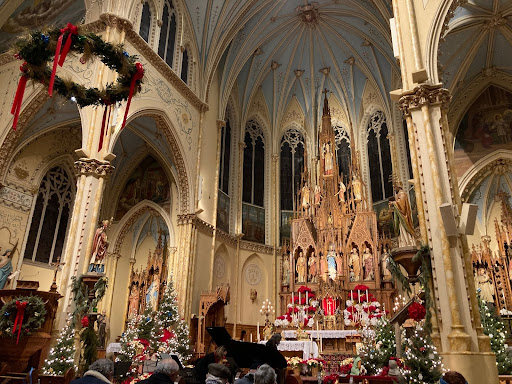by Stephanie Manning

The Pantheon Ensemble kicked off the concert with J.S. Bach’s Concerto in f, where pianist Elizabeth DeMio was joined by violinists Masha Andreini and Mari Sato, violist Yaël Senamaud-Cohen, cellist Nataliya Pschenychna, and bassist Tracy Rowell. The group approached the Bach with a rich, dramatic style fitting for both the piece and the venue. But although the architecture of St. Stanislaus is visually impressive, its extremely resonant space was not always beneficial to the ensemble’s blend and balance.
It seemed like four players was the magic number — Mozart’s Piano Quartet No. 1 in g, which substituted for Ravel’s Mother Goose Suite, largely overcame those acoustic difficulties. The four players gave the work a warm rendition, anchored by the lovely and delicate Andante movement.
Despite the absence of the Ravel, which features the bass as the Beast, Tracy Rowell still got her time in the spotlight during Elena Ruehr’s world premiere commission, Equality, Justice, Freedom (or lack thereof …). Addressing the audience as a preface to the piece, Ruehr discussed how she turned her personal feelings into music, drawing on the three themes of CityMusic’s current chamber series, “Justice, Equality, Hope.” The resulting work retains a modern style while refraining from being too avant-garde — creating tension, but not chaos.
The piece is essentially a concerto for the bass, and Rowell impressed with her clear, precise technique and deep, sensitive sound. In some of the denser passages, her solo lines were difficult to hear, a result of both the instrument’s nature and the echoey space, but the moments for bass alone were a highlight.
Ruehr purposefully turned the ensemble on its head by making bass the main instrument, as a way of spotlighting underrepresented voices. That being said, every instrument gets a solo moment or two throughout the three movements, which are played without pause. The melodic fragments of Amazing Grace scattered throughout the work came together beautifully in the ending canon, creating a lush texture that would feel equally at home in a full orchestra.
Continuing the “concerto” theme was Joaquín Turina’s Scène Andalouse for solo viola, piano, and string quartet. Rowell switched out with violist Catherine Cosbey, while Yaël Senamaud-Cohen took up the solo part. Senamaud-Cohen played confidently and convincingly, and the accompanying texture remained light enough for her sound to carry. Using every inch of her bow wisely, she led the group through a variety of tempo changes, the piece never losing its sparkling quality.
Manuel de Falla’s “Ritual Fire Dance” from El Amor Brujo rounded out this varied program, grabbing the listeners’ attention as it swapped back and forth from moments of simmering tension into a wash of sound. The work is a trademark example of the composer’s fiery spirit, which hopefully kept the audience warm as they ventured back out into the winter night.
Published on ClevelandClassical.com January 26, 2022.
Click here for a printable copy of this article



